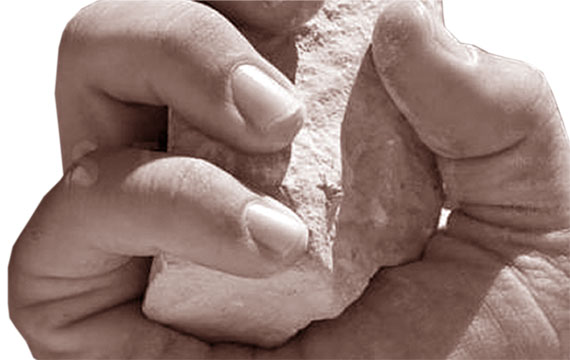Selective Shariah!
Stoning to death is not in accordance with Islamic
Shariah, says Lankan Muslim scholar:
by Latheef Farook
 As
the birthplace of Islam and the site of Islam's two holiest cities,
Makka and Madina, Saudi Arabia have been dear to the hearts of a billion
and half Muslims worldwide. However the regime there was installed in
the aftermath of World War 1. As
the birthplace of Islam and the site of Islam's two holiest cities,
Makka and Madina, Saudi Arabia have been dear to the hearts of a billion
and half Muslims worldwide. However the regime there was installed in
the aftermath of World War 1.
The concept of tribalism, monarch, royal family and family rule are
contrary to Islamic teachings which uphold equality of men and women and
the entire humanity without any barrier such as caste, race or colour.
Thus, the question whether a regime which is not based on the teachings
of Holy Quran can selectively enforce Islamic laws.
Punishment
Commenting on this, Sri Lankan Islamic scholar M. Mifly, had this to
state; "This punishment is not in accordance with Shariah law even
though it is mentioned in the sayings of the Prophet which is the
integral part of Shariah. On the contrary it is the domestic law of
Saudi Arabia (KSA) which is binding on every person entering that
country to follow it as per the international law. Any country has the
freedom to call its law in any name be it Shariah, Western or anything
else. However Shariah is not a brand name or monopoly of any person. It
is a principle and code of life.
Any punishment purportedly given under the Shariah law needs to be in
complete compliance with not only letters of Shariah but with spirit of
it also.
Protection
Shariah is a divine law of which primary objectives are protection of
one's life, wealth, dignity and gene. The distinctive feature of Shariah
is that it takes the side of the victim, not of the perpetrator.
The Shariah does not impose its law blindly on anyone for the sake of
law. The basic prerequisite principle of imposition of any Shariah law
especially criminal law is the creation of conducive environment so that
all the avenues to possible commission of such crime would have been
blocked. (This is called in Shariah as "Sadduz Zareeah").
When we analyze the Sri Lankan maid's case, the conducive environment
of blocking the avenues to such crimes (Sadduz Zareeah) were not created
by several stakeholders including Governments of KSA, Sri Lanka, her
family and her community.
Atmosphere
Allowing a young lady without being accompanied by her husband or
close relative to enter KSA and creation of an atmosphere that prevented
her from fulfilling her sexual needs are few crimes committed by KSA in
terms of Shariah.
Shariah does not impose its law on the offenders of the law, simply
because the offender is not one and only guilty, the others too directly
or indirectly become accomplices in the commission of the crime. Under
these circumstances, Shariah imposes the lesser punishment (which is
called in Shariah as "Tha'zeer").
The classic example is that during the rule of Great Caliph Umar,
there was unexpected widespread poverty. Therefore, the Ruler Caliph
Umar suspended the sentences for theft as the people would be compelled
to steal the goods under these compelling circumstances.
Therefore, I am of the firm belief that this poor housemaid can be
saved from capital punishment in terms of Shariah provided Saudi Arabia
strictly follows the Shariah law. Thus concluded Mifly.
Treaty
The founder of Saudi regime Abdul Aziz Ibn Al Saud, supported
Britain, France and Zionist Jews to defeat Turkey's Ottoman Empire. In
return British and the Zionist Jews, concluded a Treaty of Friendship
with Al Saud in 1916.
During World War I, the Ottomans lost Makka, Jeddah and Madina in
1919. Ottoman Governor Shareef Hussein declared himself the Caliph of
Makka on 7 March 1924, four days after the abolition of the caliphate on
3 March 1924.
Britain and the Zionists provided weapons, bribed with money and got
Al Saud to attack Shareef Hussein. Shareef was defeated and Al Saud
established his rule over Makka and Madina and introduced the Wahhabi
rule, which was hostile to the system of caliphate.
Thus, the caliphate system was wiped out.
Punishment
Saudi Arabia has been under severe criticism from several rights
organisations over its human rights records.
Condemning the Saudi criminal justice system and the strict
punishments, many accused them of following one law for the Westerners
and another for poor Asian and African workers.
Unfortunately for the poor and the oppressed, Saudi Arabia is big
business for so-called champions of human rights as it is the largest
oil producer in the world and a huge buyer of arms and other equipment
besides providing jobs for tens of thousands of Western expatriates. As
long as that equation continues, calls for any probe into the Saudi
justice system, supposed to be reflecting Islamic Sharia, are likely to
remain muted from Western governments. |

